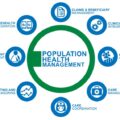Health information management (HIM)is defined as the collection analysis, storage, and protection of the quality of patient health information. This information can be either paper-based, a combination of paper and digital (hybrid), or as is more often the case, a fully electronic health record (EHR). Health information management professionals are using advanced technology as they perform most HIM-related functions. The HIM professional must have a wide range of knowledge, including HIPAA laws that protect patient privacy, data analysis, and how to harness computer systems that collect data. The role of a Health Information Management (HIM) professional is more important than you may initially think. They are essential to making sure your healthcare experience – from your doctor’s appointment or hospital visit through your insurance claim – goes smoothly.
Why is health information management important?
The HIM field is centered on the belief that proper documentation of patient records results in reduced medical errors, lower costs, and improved patient care outcomes. Medical records can prove helpful on an individual basis to evaluate a patient’s health status over time. But they can also serve an important purpose as a part of a larger data set to understand how a population’s health has changed and how particular medical interventions can impact healthcare outcomes.
Serving as a bridge that connects clinical, operational, and administrative functions, HIM pros work in a variety of settings and in a number of different job roles.
How much can you make with a degree in HIM?
Across the most common types of jobs in health information management, you could make an average salary of about $64,767 per year (or $31.14 per hour). That spans a wide variety of occupations, some requiring an associate’s or bachelor’s degree, and others may require a master’s degree or a certificate particularly managerial or leadership roles.
Where do HIM professionals work?
HIM offers a choice of many career paths – from technical work to overseeing an entire HIM department – in a variety of settings. HIM professionals are employed by hospitals, physician offices, surgery centers, long-term care facilities, consulting firms, government agencies, and even insurance companies. With an HIM degree, employment opportunities can include data analysis, HIPAA privacy, medical coding, compliance, clinical documentation as well as HIM management. In fact, HIM professionals can obtain professional credentials such as Registered Health Information Administrators (RHIA), who often hold leadership positions such as HIM directors or managers, and Registered Health Information Technicians (RHIT), who often hold technical jobs and specialize in medical coding, cancer/disease registry, and supervisory positions. Also, the American Health Information Management Association (AHIMA) offers specialty credentials in data analysis, documentation improvement, medical coding, and privacy.
How can I prepare for a career in HIM?
The HIM degree programs at Herzing University provide students with a comprehensive understanding of the management of medical information. For example, every HIM-related program offers students access to state-of-the-art virtual labs and a variety of health information management systems actually used in healthcare organizations. There are several options, including completely online, to further your education and pursue your career in health information management:
- Bachelor of Science in HIM can be completed in as little as 36 months
- A diploma in Insurance Billing and Coding can be completed in 12 months.
- Associate and Associate of Applied Science in Health Information Management can be completed in 20 months
- Associate and Associate of Applied Science in Insurance Billing and Coding can be completed in 20 months.
Top Health information management jobs to consider
To help you gain a clearer understanding of what HIM jobs would be like, we used job posting analysis software to examine more than 5,600 job postings and identify some of the more common job titles seeking candidates with a Health Information Management Bachelor’s degree.1
- Health information manager
Working as a health information manager, you would be responsible for maintaining and ensuring the security of all patient records and data. Professionals in this sphere are tasked with staying up to date with consistently evolving information technology, overseeing medical recordkeeping teams, ensuring departmental compliance with laws relating to health information systems, tracking trends, and auditing data for accuracy.
- Medical coder
A type of health information technician, medical coders are typically responsible for reviewing all patient information for issues like preexisting conditions, so the data can be coded properly. They are then tasked with assigning appropriate diagnoses and procedure codes for patient care, population health statistics, and billing purposes. In fact, medical coders work as a sort of liaison between the healthcare providers and the billing offices.
- Data analyst
In general, a data analyst in healthcare studies and compiles medical data. Their expertise in computer-based applications empowers these professionals to identify insights from medical data regarding ways to improve patient care. By tapping into patient health data, analysts are able to gauge the effectiveness of certain treatments or determine the impact of cost-saving efforts and patient safety initiatives.
- Outpatient coding compliance auditor
Medical record audits are a key way healthcare organizations seek to improve their clinical documentation and improve the financial health of the medical provider. Working as a medical coding compliance auditor, you’d be responsible for performing such audits, which include a review of clinical documents, physician billing records, coding records, and administrative data. These reviews can help identify coding mistakes, billing issues, and other important financial factors.
- Clinical documentation specialist
Professionals who pursue a career as a clinical documentation specialist have a variety of different core job duties to look forward to. One aspect of this career includes managing clinical trials and service documents. Clinical documentation specialists also maintain charts, medical records, and reports, solving any issues involving documentation along the way. Another pivotal duty within this role is ensuring that both accuracy and quality are maintained among medical coders, doctors, nurses, and other healthcare staff within their organization.
- Clinical systems manager
Not to be confused with a clinical manager, it may be more helpful to think of this role as the computer systems administrator of the clinic. They are responsible for updating and maintaining computer systems used in healthcare. While general tech skills are key, this job will also require specialized knowledge about healthcare-specific hardware, software, and networks. This role can be an excellent option for someone with a background in information technology and who would like to apply their skills in a healthcare setting.
- Medical research analyst
While this job title did not appear in our analysis of job postings, it is an intriguing option to remember for those who have an interest in research. Medical research analysts typically work with a team conducting medical studies and clinical trials. Using their scientific, medical, analytical, and even financial knowledge, these healthcare professionals work with physicians and scientists to coordinate clinical research studies. This can include identifying patients, tracking inventory, collecting data, overseeing protocols, and even acting, at times, as a liaison between supervising physicians and research sponsors.






